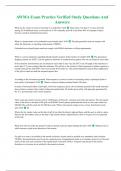AWMA Exam Practice Verified Study Questions And
Answers
What are the 4 rules in terms of investing in a small firm? ANS Time frame of at least 3-5 years, diversify
among 20-30 different issues, avoid turnover of 30% annually, and sell if and when 40% of company's shares
become owned by institutional investors.
What is a characteristic of an unfunded excess benefit plan? ANS The plan generally need not comply with
either the disclosure or reporting requirements of ERISA.
Unfunded excess benefit plans need not comply with ERISA disclosure or filing requirements.
What is a correct statement regarding federal transfer taxation of the transfer of wealth? ANS The generation-
skipping transfer tax (GSTT) can be applied to transfers of wealth between parties who are not related to each other.
If the transferor and transferee are not related to each other in any way, the GSTT can still apply if the transferee is
more than 37.5 years younger than the transferor. The gift tax is tax exclusive. Direct payment of tuition expenses is
exempt from gift tax and GSTT, but is not exempt from estate tax. The marital deduction merely delays application
of the gift or estate tax until the recipient spouse dies.
According to the investment pyramid, what sequence is correct in terms of increasing safety of principal (least to
most safety of principal)? ANS *futures contracts, balanced mutual funds, EE bonds
In terms of increased safety of principal, of the four sequences given, the investment pyramid in the study materials
shows futures contracts (least safety), balanced mutual funds, EE bonds (most safety with principal guaranteed by
the U.S. government) is the correct sequence.
Three years ago, Kerri received a gift of 1,000 shares of Mica Inc. common stock from her parents. The fair market
value of the stock on the date of the gift was $20,000. Kerri's parents purchased the stock several years earlier for
$40,000. She sold this stock for $31,000 last week. What is the amount of gain or loss, if any, from Kerri's stock
sale? ANS $0
Where the fair market value on the date of gift is less than the donor's adjusted basis, and the asset is sold at a price
between the fair market value on the date of gift and the donor's adjusted basis, there is no gain or loss recognized
on the sale.
What trust will not entitle the grantor to take an annual exclusion upon funding the trust? ANS *Bypass trust in
which income is paid at the discretion of the trustee
For gifts to a trust to be entitled to the annual exclusion, income must be payable on a mandatory basis (Section
2503(b)), the beneficiaries must be given a general power of appointment (such as a Crummey power) over the trust
assets, or the trust must conform to the requirements of Section 2503(c). A bypass trust that gives the trustee
discretion over income is not entitled to the annual exclusion.
, When suggesting portfolio assets for a millennial investor, which would best suit that age group in general? ANS
*36% equities, 22% fixed income, 21% real estate, 21% alternative investments
Investors under 40 are more likely to choose real estate and alternative investments and less likely to choose equities
and fixed income investments, as compared to investors 40 and over.
What indicator would a contrarian investor interpret as a bullish indicator? ANS *bullish specialist sentiment
Specialists are considered "smart money" and, therefore, if they are bullish a contrarian investor would follow their
sentiment.
Your client, John Westfall, is age 72. He has started taking required minimum distributions from his 401(k), which
has grown to over $3 million. He currently has no IRA account. His RMDs are mostly an annoyance, as he doesn't
need the funds to cover his living expenses, and he doesn't want to leave too much of an inheritance to his children.
What planning option might you discuss with John? ANS *John could roll over a portion of the funds from his
401(k) to an IRA, and then execute a qualified charitable distribution from his IRA to his alma mater, the University
of Notre Dame.
Because John is over age 70½, he may utilize a QCD. However, the distribution must be made to a 50%
organization—churches, schools, Red Cross, governmental units, etc. The contribution may not go to a 30%
organization—veteran's groups, fraternal organizations, etc. The distribution must be from an IRA, and it is perfectly
acceptable for the IRA funds to come from a rollover. *
Bill is a participant in his company's stock bonus plan that was established two years ago when the company
contributed 1,000 shares of its stock to Bill's plan account. At the time, these shares were each valued at $15. During
the current year, Bill took a lump-sum distribution from the plan and sold his shares for $25 each. Bill will have to
report ordinary income for the current year equal to which one of the following amounts? ANS $15,000
Bill is immediately taxed on the cost, or basis, of the securities received, and at ordinary income rates. Hence, he
would have to include $15,000 (1,000 shares × $15) as ordinary income for the current year. Bill's net unrealized
appreciation (NUA) in the distribution is taxed during the current year. His NUA equals $10 per share ($25 per share
less $15 per share), so he also will have to report a long-term capital gain of $10,000 ($10 NUA per share × 1,000
shares).
In the scenario of an adviser who remains professional while a client is acting agitated toward that adviser, which
one of the following levels of emotional intelligence is the highest level the adviser has reached? ANS
Emotional regulation




